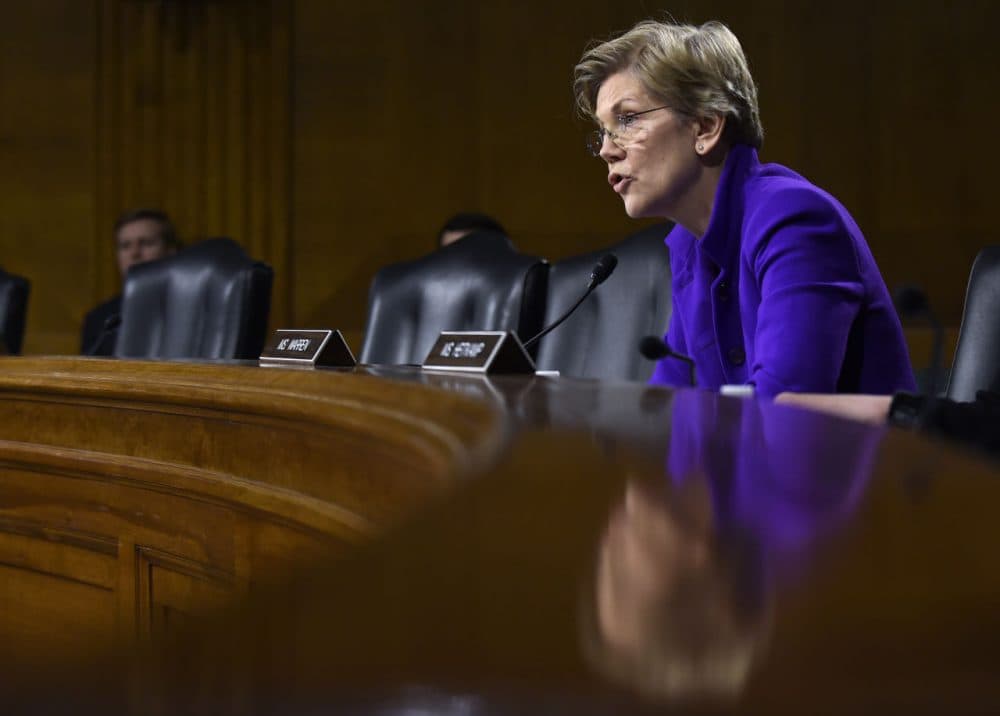Advertisement
Candidate Or Not, Can Warren’s Populist Message Shape 2016?
Resume
Massachusetts U.S. Sen. Elizabeth Warren is an unusual rookie politician. The freshman senator has a seat at the Democratic leadership table and a loudspeaker many veteran politicians would envy.
So naturally her doting super fans are hoping she'll run for president in 2016. But whenever Warren is asked if she's considering a bid for commander-in-chief, she gives the same response. In a Morning Edition interview in December, she insisted four times in four different ways that she's "not running for president."
Still, her fan club refuses to take "no" for an answer.
Two liberal advocacy groups — MoveOn.org and Democracy for America — have essentially set up a shadow campaign for her in the early voting states of Iowa and New Hampshire.
Ginny Towler attended a recent rally in Manchester with her mother. In between chants of "Run, Warren, Run," the 56-year-old explained that Warren speaks to issues plaguing communities of color.
"Elizabeth Warren is fearless," Towler said. "She's one of us, she came from very humble roots, she speaks her truth and that's what this is supposed to be about. We don't need politicians. I loathe politicians, I loathe them."
Towler says a Warren candidacy could sway Democrats such as Hillary Clinton on economic issues in a primary election.
"Elizabeth Warren has to run, because if we don't have her voice setting the bar for where the conversation should go, we might as well just not even vote."
Warren supporter Ginny Towler
"Elizabeth Warren has to run, because if we don't have her voice setting the bar for where the conversation should go, we might as well just not even vote," Towler said.
To her groupies, Warren is not a politician, but rather a populist champion for the common man.
'When Elizabeth Warren Speaks, People Listen'
Warren's populist rise is not that unusual, according to Michael Kazin, a professor at Georgetown University who has written extensively about the history of populism.
"In times like this, which is somewhat akin to the Great Depression, somewhat akin to the 1890s when the original populists began, you have populist rhetoric which becomes more and more popular," said Kazin, also co-editor of the left-leaning magazine Dissent.
Kazin says historically Democrats have often used populist lingo. So in the arc of political history, Warren's messaging is sort of normal.
And when you ask Warren to explain her role in party politics, she sticks to that populist rhetoric.
"My role is to go to Washington to fight on behalf of working families," she said in a phone interview. "That's been my role from the first day. That's still my role today, and that's gonna be my role tomorrow."
But her colleague, fellow Massachusetts U.S. Sen. Ed Markey, says her strength is her influence.
"When Elizabeth Warren speaks, people listen. And that's her power, you know. She stands up to be a North Star, politically," he explained.
Recently, Warren has managed to block President Obama's pick for a Treasury Department appointment and continues to lead a liberal push against a rollback of Dodd-Frank banking regulations passed in December as part of a $1.1 trillion spending bill.
Warren is so popular with her fellow Democrats that it's rare to openly criticize her. But behind the veils of praise some moderates worry that her words may be polarizing.
"The question for Sen. Warren is: Will she decide to be more of an advocate, or will she be more of a substantive leader?" asked former Indiana Sen. Evan Bayh, a known centrist in the party. "If she's only an advocate, she runs the risk of being divisive. If she says it's 100 percent my way or nothing, then that tends to lead to inaction."
That's a fear Delaware Gov. Jack Markell shares. Markell is also centrist Democrat, and he says he has a lot of respect for Warren but differs with her economic prescriptions.
"I think the best way of addressing issues of income inequality is to lift all people up," he said. "We shouldn't begrudge those at the top from doing well."
Markell points to Walter Mondale's 1984 defeat and says when his party has moved too far to the left, it has lost elections.
Can Warren Push Dems To The Left?
According to Kazin, the historian from Georgetown, Warren may need more than just a strong populist message to effect the change she's seeking.
"One of the things that populists usually need to have on their side are social movements which speak their same language and which mobilize people behind them," Kazin said. "That's something that Franklin Roosevelt and Harry Truman had as liberal Democrats in the 1930, 1940s. It's something that Elizabeth Warren doesn't quite have now."
But as we inch closer to the 2016 campaign, it seems politicians are increasingly eager to discuss income inequality, and Kazin says it seems the culture in America is swinging more and more in Warren's favor.
"I think the base of the Democratic Party, especially in the last two or three years, has moved very much in her direction, partly because of what she's doing, partly because of what social movements are doing," he said.
Whether or not Warren runs for president, it seems she has the clout to push her party to the left. Clinton met privately with Warren in December, reportedly to ask for policy suggestions.
And just this week conservative super PAC American Crossroads released an ad blasting Clinton for taking foreign donations, but the pictures in the ad were set to soundbites from Warren.
It seems the far right is just as delighted as the far left with the possibility of Warren as a foil to Clinton.
This segment aired on February 25, 2015.
